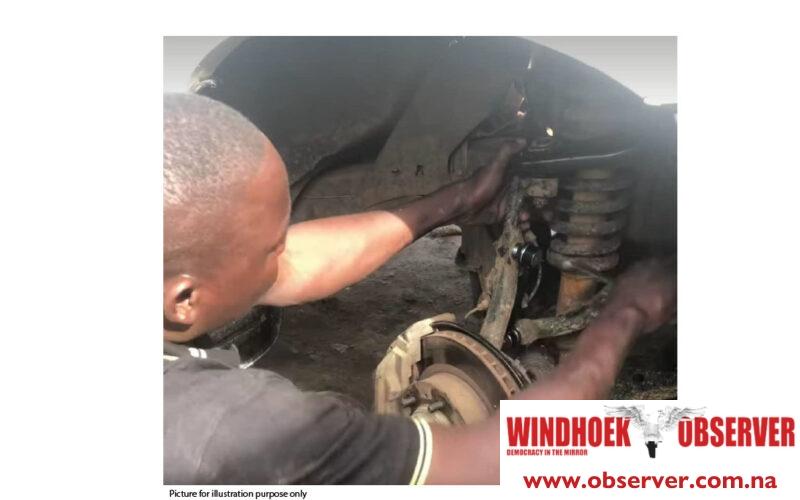Hertta-Maria Amutenja
The theft of car parts in garages has become a problem that affects both business owners and customers.
In 2022, Tangeni Mushelenga took his vehicle to a local mechanic for service.
They informed him that the engine required repair.
Mushelenga collected the vehicle in the afternoon of the same day.
“When I took the car to another mechanic, he informed me that it had never been serviced. In fact, they exchanged my genuine parts with old ones,” he said.
Mushelenga explained that he has since learned to mark his parts whenever he takes any vehicle for service.
“I can’t reveal what I do, else the mechanics will know and find a new way of stealing our parts. I have also learned to never leave my car with a mechanic. If you know the mechanic, sometimes it’s best that he works on the car at your house,” he said.
He said that even formal, large garages experience the trend of car part theft.
“Employees from even larger garages participate in this scheme. For instance, imagine you take your car to be fixed by a guy who works for Chevrolet, and there is someone else who has a similar car as yours, and you are willing to pay him a good sum of money for a part. He will definitely take the part from the other car and put it on yours, “said Mushelenga.
Mushelenga suggested that all garages install CCTV, and customers should mark their items to prevent theft.
Mechanics and garage owners are implementing stricter security measures, such as installing CCTV cameras and conducting thorough background checks on employees.
They are also implementing detailed inspection and documentation processes for all vehicles.
Despite these efforts, car part theft remains a challenge.
Reports from various sources in the automotive industry reveal a trend of employees stealing and exchanging car parts, leading to increased mistrust and financial loss.
Andreas Shatipamba, the owner of Shatta Auto Repairs, recounted instances where employees removed parts or exchanged them to sell externally.
“Theft of parts is very common among mechanics. I had to discharge a few employees because they were stealing clients’ parts or exchanging them. They would either remove parts like sensors, gearboxes, or even just bulbs and leave it like that, or they would exchange parts,” he said.
In one incident, an employee exchanged the gearboxes of a car that was brought into the workshop to sell it outside the workshop.
Shapumba said the employee had a personal client and wanted the money for himself.
In some instances, Shapumba says customers falsely claimed pre-existing issues to exploit free repairs.
“One would have a client bring in a car, and after it’s fixed, they would say something was working when, in fact, it was not. They say this because they want a free fix and blame the mechanic. It’s a very tricky business, and one needs to be very vigilant, especially when inspecting the car before booking it in for fixing,” he said.
A senior mechanic from an auto repair shop admitted to once stealing a sensor, which led to his dismissal.
He spoke to the observer on condition of anonymity.
“ I once stole a sensor, and it got me fired. My boss found out when he wanted to start the car, and it was not starting. We were just the two of us in the workshop when he discovered it,” he said.
He said he long realised that what he was doing could take his bread away forever.
General Manager of M+Z Motors Group Richard Slamet, explained the security measures the company employs to prevent such incidents.
“We are very big on security; our gates are always closed, and we have camera systems. Our employees also get screened regularly, and we conduct thorough background checks before hiring anyone,” he said.
Slamet added that they use a checklist to document any damages or lost parts before servicing a car, ensuring that the condition is agreed upon with the owner before and after the service.
Namibian police Chief Inspector Elifas Kuwinga confirmed that these complaints are common but noted that owners rarely report such cases.
“The complaints are there, but the owners hardly open cases. I have advised a few, but they would not open cases. It seems they just want to handle it on their own or ask for the money to be paid,” Kuwinga said.




